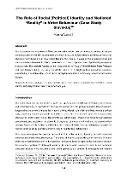The Role of Social (Political) Identity and Mediated “Reality” in Voter Behaviour (Case Study Slovakia)

Autor
Carrilho, Kleber
Horsmanheimo, Laura
Linnamäki, Katinka
Helsinki Hub on Emotions, Populism and Polarisation
Datum vydání
2024Publikováno v
Working Papers in Emotions, Populism and PolarisationNakladatel / Místo vydání
University of Helsinki (Helsinki)Ročník / Číslo vydání
3 (1)ISBN / ISSN
ISBN: 0-000-00000-0eISSN: 2737-3657Informace o financování
MSM//SVV260730
Metadata
Zobrazit celý záznamKolekce
Abstrakt
The study examines why voters in Slovakia's corruption-ridden political landscape continue to supportpoliticians with criminal ties, despite extensive media exposure of their misconduct. Drawing from LilianManson's 'Uncivil Agreement: How Politics Became Our Identity', it suggests that emotional bonds andsocial identities often override rational evaluations, with media representation of political figures playinga pivotal role. The analysis focuses on the representation of Slovak Prime Ministers Peter Pellegriniand Igor Matovič during the early COVID-19 pandemic, highlighting how journalistic practices,intensified by a multiplier effect, shape public perceptions and impact democracy in Central and EasternEurope.
Klíčová slova
balance analysis, emotions, hostile media effect, media discourse, representation, social identity, self-categorization theory, sentiment analysis
Trvalý odkaz
https://hdl.handle.net/20.500.14178/2563Licence
Licence pro užití plného textu výsledku: Creative Commons Uveďte původ-Neužívejte dílo komerčně 4.0 International


